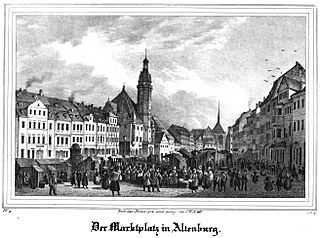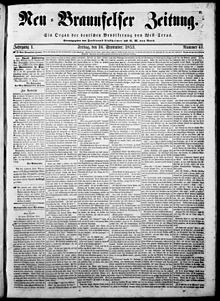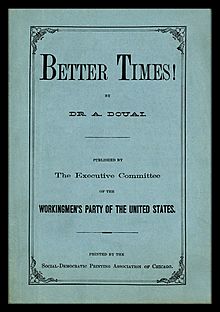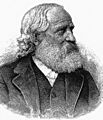Adolph Douai facts for kids
Karl Daniel Adolf Douai (1819 – 1888), known as "Adolf," was a German Texan teacher. He was also a socialist and abolitionist newspaper editor. Douai had to leave Texas in 1856 because he wrote against slavery. He spent the rest of his life running schools in Boston, New England. People remember Douai as one of the main American Marxists of the 1800s. He was also a leader in starting the Kindergarten movement in America.
Contents
Adolf Douai's Life Story
Early Years and Education
Adolf Douai was born on February 22, 1819, in Altenburg, Thuringia. His father was a school teacher. His family was from France and had moved to Dresden.
The Douai family was not rich. Adolf started working at age 8. But he still got a good education. He graduated from the Altenburg Gymnasium and the University of Leipzig. There, he studied philology (the study of language) and history. As a boy, he worked as a newsboy and helped his father teach farm children. He also crocheted woolen shawls.
Adolf was not well-fed as a child. He was short, only 4 feet 8 inches (1.42 m) tall at age 19.
While at university, Douai needed more money. He wrote several novels and two religious papers to earn extra income.
After Leipzig, Douai wanted to study philosophy and pedagogy (the art of teaching) at the University of Jena. He could not get in right away. So, he worked as a private tutor in Russia to save money. He passed exams at the University of Dorpat. This earned him a Doctor's title and a job with the Russian government.
Douai married Baroness Agnes von Beust on September 26, 1843. They got married in Königsberg. They had ten children together.
Living in Russia changed Douai's views. After five years, he returned to Altenburg. He believed a revolution for a constitution and democracy was coming. He bought a building and opened his own preparatory school.
When the Revolutions of 1848 happened, Douai helped organize groups for workers and students. He was active in politics. His political actions led to him being arrested and briefly imprisoned. This forced him to close his school.
Life in Texas
After leaving prison, Douai was encouraged by the government to move away. He came to the United States and settled in Texas. He lived in the German town of New Braunfels. In November 1852, he helped raise money to start the Neue Braunfelser Zeitung. This was a German newspaper edited by his friend Ferdinand Lindheimer.
Douai also tried to start another school. But he faced challenges due to local opposition. The school eventually closed.
After his first business failed, Douai moved to San Antonio. He started a new newspaper called the San Antonio Deutsche Zeitung (German News). In his paper, Douai strongly spoke out against slavery. He believed it was wrong and did not fit with a free country. He wanted slavery to end. Douai also suggested creating a state in western Texas where slavery wasn't allowed.
These ideas were very unpopular in Texas, which was a slave-state. Many people disagreed with him, and his newspaper lost money. Because of this, he had to sell his newspaper in 1856.
Moving North
As the American Civil War was approaching, Douai moved north to Boston, Massachusetts. He worked as a private tutor. He also taught at a school for the blind in South Boston. In Boston, Douai started a German workingmen's club. In 1859, this club opened a three-classroom school. This school had the first Kindergarten in America.
In 1860, Douai became the editor of the New York Demokrat newspaper. He soon left this job to become the Principal of the Hoboken Academy. He taught there for six years. In 1866, he moved to New York City to open his own new school. This school lost its building in 1871 due to a street expansion. Douai then moved to Newark, New Jersey. He became the principal of the Green Street School there. He stayed in Newark until 1876.
After leaving his position in Newark, Douai was offered a chance to start a new school in Irvington, New Jersey. But they could not find a suitable building. This basically ended Douai's career as a teacher.
He was an early and important member of the Socialist Labor Party of America. This was the first Marxist political party in America. It was started in 1876 as the "Workingmen's Party of the United States."
In 1877, there was a plan for Douai to translate Das Kapital by Karl Marx into English. In January 1878, a new German-language socialist newspaper, the New Yorker Volkszeitung, was started. Douai began writing a lot for this newspaper. It was here that he became very well known as a journalist and writer.
Later Life and Legacy
Adolf Douai passed away on January 21, 1888, in New York. He had been sick with a chronic throat problem. A public memorial was held for him on January 23.
An English translation of Adolf Douai's autobiography is kept at the San Antonio Public Library.
Images for kids
 | Selma Burke |
 | Pauline Powell Burns |
 | Frederick J. Brown |
 | Robert Blackburn |





